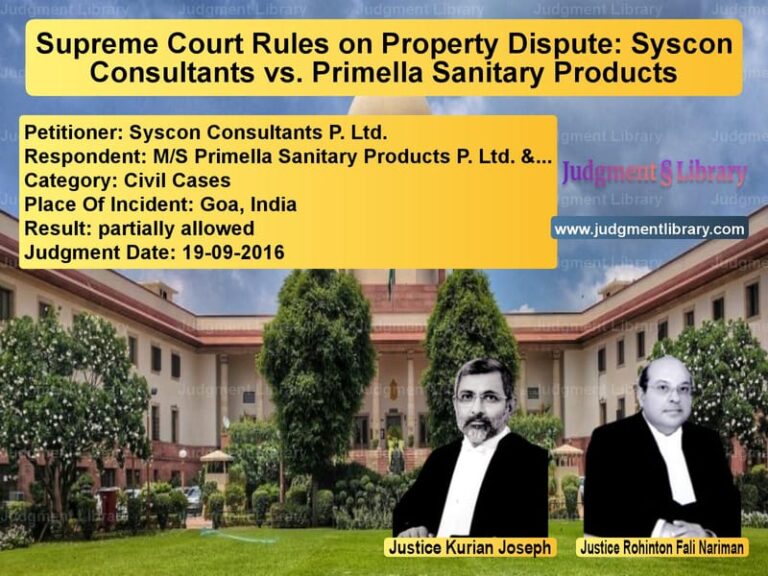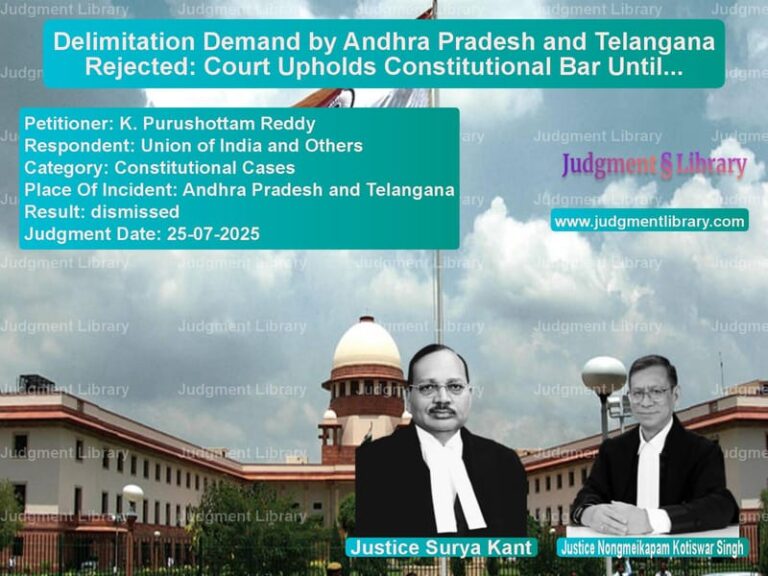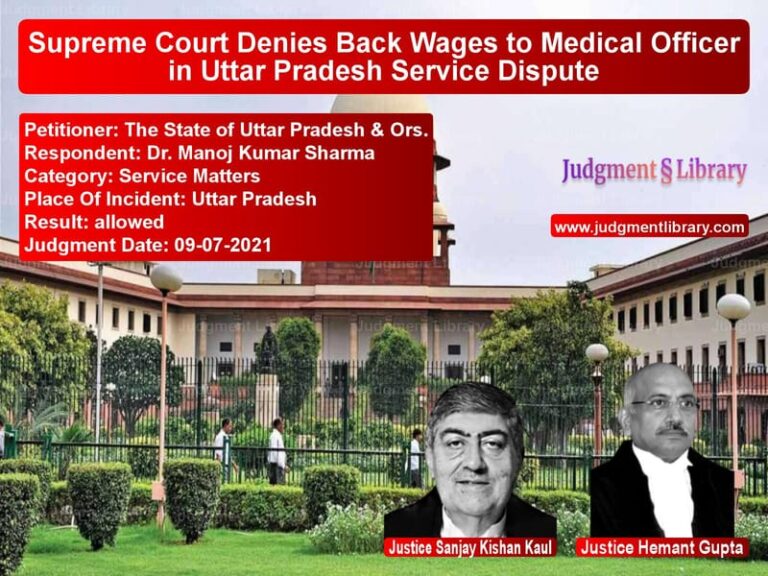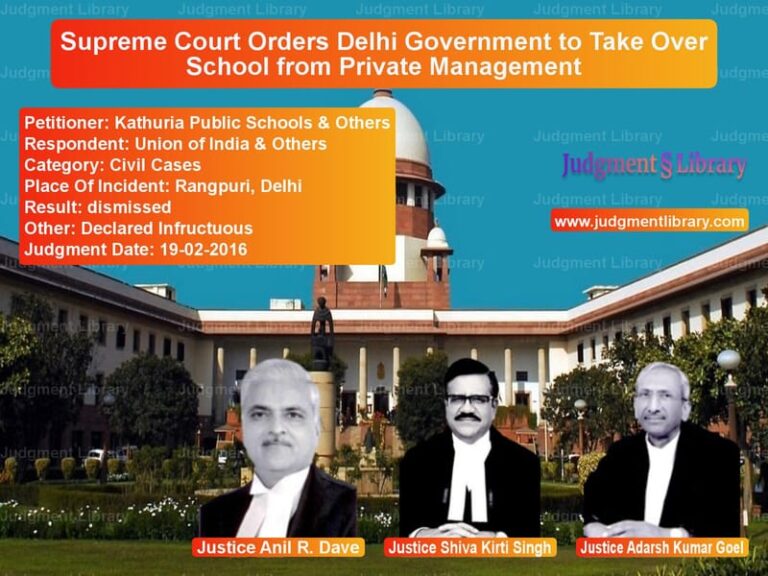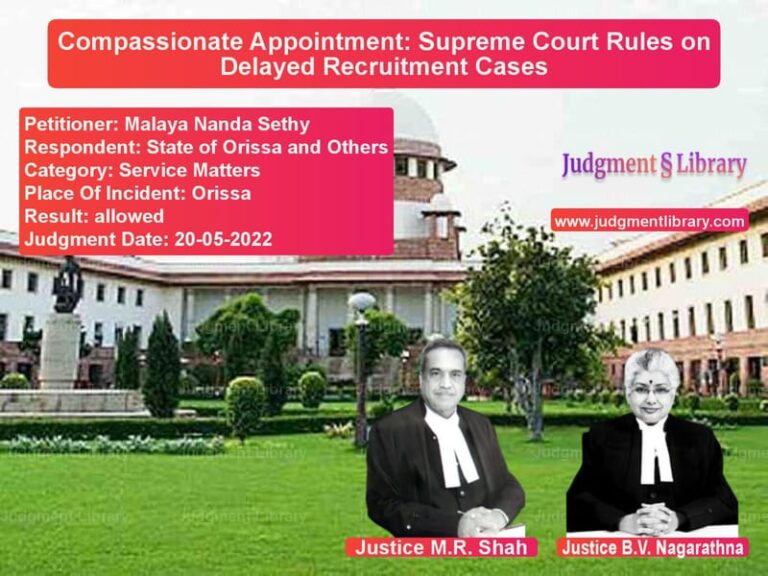Supreme Court Cancels Anticipatory Bail of Proclaimed Offender in Haryana Criminal Case
The Supreme Court of India recently delivered an important judgment in the case of State of Haryana v. Dharamraj, addressing a critical legal issue concerning anticipatory bail granted to an accused who had been declared a proclaimed offender. The ruling reinforces the principle that individuals evading the legal system should not be granted pre-arrest bail unless exceptional circumstances exist.
Background of the Case
The case originated from an FIR registered on July 31, 2020, at Badshahpur Police Station, Gurugram, under multiple sections of the Indian Penal Code (IPC), including Sections 147, 148, 149, 323, 325, 341, 342, and 427. Subsequently, additional sections—186, 353, and 364 IPC—were also added.
The accused, Dharamraj, was declared a proclaimed offender under Section 82 of the Code of Criminal Procedure (CrPC). Despite this, the Punjab and Haryana High Court granted him anticipatory bail on December 3, 2021, reasoning that the maximum sentence for the offenses in the FIR did not exceed seven years and that stringent conditions could be imposed to prevent the accused from tampering with evidence.
The State of Haryana challenged the High Court’s order before the Supreme Court, arguing that a proclaimed offender should not be granted anticipatory bail.
Key Legal Issues
- Whether anticipatory bail should be granted to a person who has been declared a proclaimed offender.
- The applicability of the Supreme Court’s earlier rulings on bail and judicial discretion.
- The effect of an accused evading arrest and whether such conduct should disentitle them from relief under Section 438 of the CrPC.
Petitioner’s (State of Haryana) Arguments
- The accused had been declared a proclaimed offender under Section 82 CrPC, meaning he deliberately evaded arrest.
- Courts have consistently held that individuals who abscond should not be granted anticipatory bail.
- The High Court wrongly relied on Arnesh Kumar v. State of Bihar (2014) 8 SCC 273, which pertains to unnecessary arrests in cases where the maximum punishment is up to seven years. However, the accused in this case was charged under Section 364 IPC, which carries a maximum sentence of life imprisonment.
- Granting anticipatory bail to a proclaimed offender sets a bad precedent and undermines the legal process.
Respondent’s (Dharamraj) Arguments
- The respondent argued that he had been wrongly implicated and that the police manipulated records to portray him as a proclaimed offender.
- The High Court correctly noted that he had no prior criminal history and that bail conditions could prevent any interference with the investigation.
- The High Court’s discretion should not be overturned unless it was exercised arbitrarily.
Supreme Court’s Judgment
The Supreme Court ruled in favor of the State of Haryana, setting aside the High Court’s order and cancelling the anticipatory bail granted to the accused. The key observations of the Court were:
- On Proclaimed Offenders and Bail: The Court held that individuals declared proclaimed offenders should not ordinarily be granted anticipatory bail. The ruling referred to earlier judgments, including Lavesh v. State (NCT of Delhi) (2012) 8 SCC 730 and State of Madhya Pradesh v. Pradeep Sharma (2014) 2 SCC 171, which emphasized that absconding accused are not entitled to pre-arrest bail.
- High Court’s Error in Applying Arnesh Kumar Judgment: The Supreme Court pointed out that Arnesh Kumar applied only to offenses with a maximum sentence of seven years, whereas the accused in this case faced charges under Section 364 IPC, which carries a punishment of life imprisonment.
- Judicial Discretion and Exceptional Cases: While acknowledging that rare exceptions exist where anticipatory bail may be granted even to proclaimed offenders, the Court found that no such exceptional circumstances were present in this case.
- Supervening Circumstances for Bail Cancellation: The Court reiterated that anticipatory bail can be revoked when new facts come to light, particularly when the accused has evaded due process.
Directions Issued
- The Supreme Court set aside the High Court’s order granting anticipatory bail to the respondent.
- The respondent was directed to surrender within four weeks before the trial court.
- The respondent was permitted to apply for regular bail, which would be considered on its own merits.
Impact of the Judgment
This ruling has significant implications for anticipatory bail jurisprudence:
- Strict Approach Against Proclaimed Offenders: The judgment reinforces that those who evade arrest and abscond from legal proceedings should not ordinarily be granted anticipatory bail.
- Clarification on the Scope of Judicial Discretion: The ruling highlights that courts must exercise caution while granting pre-arrest bail, particularly in serious cases involving proclaimed offenders.
- Limited Applicability of Arnesh Kumar Judgment: The Court clarified that the principles in Arnesh Kumar do not apply to cases where the accused faces serious charges with higher sentences.
Conclusion
The Supreme Court’s decision in State of Haryana v. Dharamraj sets a crucial precedent for anticipatory bail cases, particularly for individuals declared proclaimed offenders. By cancelling the bail granted by the High Court, the ruling upholds the principle that absconding accused should not be granted leniency unless exceptional circumstances justify it. This judgment will guide future cases where pre-arrest bail is sought by individuals who have deliberately evaded the legal process.
Petitioner Name: State of Haryana.Respondent Name: Dharamraj.Judgment By: Justice Ahsanuddin Amanullah, Justice S.V.N. Bhatti.Place Of Incident: Haryana.Judgment Date: 29-08-2023.
Don’t miss out on the full details! Download the complete judgment in PDF format below and gain valuable insights instantly!
Download Judgment: state-of-haryana-vs-dharamraj-supreme-court-of-india-judgment-dated-29-08-2023.pdf
Directly Download Judgment: Directly download this Judgment
See all petitions in Bail and Anticipatory Bail
See all petitions in Judgment by Ahsanuddin Amanullah
See all petitions in Judgment by S.V.N. Bhatti
See all petitions in allowed
See all petitions in supreme court of India judgments August 2023
See all petitions in 2023 judgments
See all posts in Criminal Cases Category
See all allowed petitions in Criminal Cases Category
See all Dismissed petitions in Criminal Cases Category
See all partially allowed petitions in Criminal Cases Category


